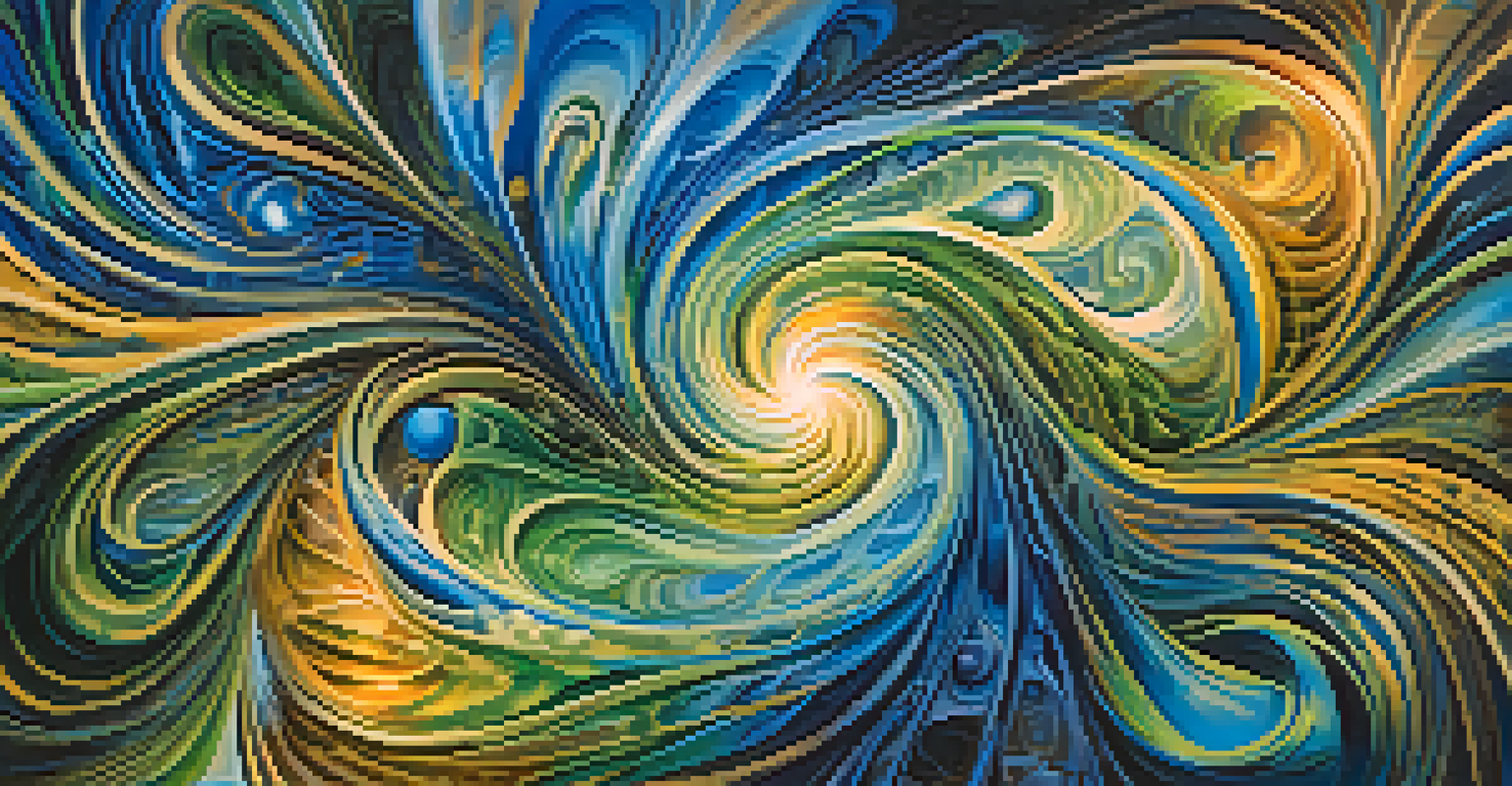The Philosophical Implications of Psychedelic Experiences

Understanding Psychedelics: A Brief Overview
Psychedelics, often referred to as entheogens, are substances that alter perception, mood, and cognitive processes. Common examples include substances like LSD, psilocybin mushrooms, and ayahuasca. These experiences can lead to profound insights, not just about the self, but about the nature of reality.
Psychedelics are a doorway to the depths of the mind, where the boundaries of identity and reality dissolve.
Historically, these substances have been used in various cultures for spiritual and healing purposes. They offer unique windows into the mind, often illuminating aspects of existence that are typically obscured in our daily lives. By examining these experiences, we can begin to understand their philosophical implications.
As we dive deeper into what psychedelics reveal, we'll explore how these altered states of consciousness challenge our understanding of reality, self, and existence itself.
The Nature of Reality: Insights from Psychedelic Experiences
One of the most striking implications of psychedelic experiences is the challenge they pose to our conventional understanding of reality. Many users report sensations of interconnectedness with the universe, leading them to question the boundaries between self and other. This can evoke a sense of unity that defies traditional separations we hold.

For instance, during a session, someone might experience a profound realization that everything in the universe is interconnected, reshaping their view of life and existence. This perception aligns with various philosophical traditions, such as pantheism, which posits that the divine pervades all aspects of the universe.
Psychedelics Challenge Reality Perception
Psychedelic experiences often lead to a profound sense of interconnectedness and challenge conventional views of reality.
Such revelations can be both enlightening and disorienting, as they compel individuals to reconsider long-held beliefs about what is 'real' and how we relate to the world around us.
Exploring the Self: Ego Dissolution and Identity
Many psychedelic experiences lead to a phenomenon known as ego dissolution, where the sense of self becomes fluid or even disappears. This can be both liberating and unsettling, as individuals navigate the loss of their identity. Philosophically, this raises questions about the essence of self and consciousness.
The experience of oneness with the universe is not just a psychedelic experience; it's a fundamental truth of existence.
For example, if one's sense of self can dissolve, what does this imply about the nature of identity? Are we merely constructs of our thoughts and experiences, or is there something more intrinsic that defines us? These questions echo themes in existential philosophy, where notions of self are often scrutinized.
This exploration of identity during psychedelic experiences can lead to a deeper understanding of what it means to be human, fostering empathy and compassion for others as the barriers of self dissolve.
Time Perception and the Nature of Existence
Psychedelics often alter the perception of time, making minutes feel like hours and allowing users to experience moments in a profoundly different way. This altered time perception can lead to philosophical reflections on the nature of existence and the linearity of time. Are past, present, and future as distinct as we believe?
Consider the feeling of timelessness experienced during a peak psychedelic moment; users frequently describe a sensation of being fully immersed in the 'now.' This aligns with some Eastern philosophies that emphasize mindfulness and the importance of present-moment awareness.
Ego Dissolution Offers Identity Insights
Experiencing ego dissolution during psychedelics raises philosophical questions about the essence of self and identity.
By challenging our conventional views of time, psychedelics encourage us to ponder the fluidity of existence and how our understanding of time influences our lives and decisions.
Moral and Ethical Considerations of Psychedelic Use
As we delve into the philosophical implications of psychedelics, it’s crucial to consider the moral and ethical dimensions of their use. With the potential for profound insights, there also comes responsibility in how these experiences are approached and integrated into everyday life. This raises questions about consent, safety, and the potential for harm.
For instance, the question arises: Should psychedelics be administered in controlled settings, or can they be safely used recreationally? This debate reflects broader societal discussions about drug use, mental health, and personal freedom.
Ultimately, navigating the ethics of psychedelics requires a balance between the pursuit of knowledge and the well-being of individuals and communities, guiding us toward responsible exploration.
Psychedelics and Spirituality: A Deep Connection
Many individuals report that their psychedelic experiences have a deeply spiritual quality, leading to feelings of transcendence and connection to a higher power. This intersection of psychedelics and spirituality invites exploration into the philosophical implications of these encounters. Are these experiences genuine spiritual awakenings, or simply chemical reactions in the brain?
For many, the insights gained during these experiences can lead to lasting changes in beliefs and behaviors, fostering a sense of purpose and connection to something greater than oneself. This phenomenon is not new; throughout history, various cultures have integrated psychedelics into spiritual practices, seeking to bridge the gap between the mundane and the divine.
Integrating Insights for Personal Growth
Successfully integrating the insights gained from psychedelics into daily life can lead to transformative changes in behavior and perspective.
By examining the spiritual aspects of psychedelic experiences, we can gain a deeper understanding of humanity's quest for meaning and the diverse ways we seek to connect with the universe.
Integrating Psychedelic Experiences into Daily Life
The insights gained from psychedelic experiences often require integration into daily life for them to be truly transformative. This process can be complex, as individuals work to make sense of their experiences and apply newfound wisdom to their everyday realities. Philosophically, this touches on the idea of how we incorporate knowledge and insights into our lives.
For example, someone who has experienced a profound sense of interconnectedness may begin to approach relationships and environmental issues with a greater sense of responsibility and compassion. This reflects the importance of not just having experiences, but also integrating them meaningfully into our actions.

Ultimately, the journey of integration invites ongoing reflection and growth, as individuals strive to live in alignment with the insights gleaned from their psychedelic journeys.